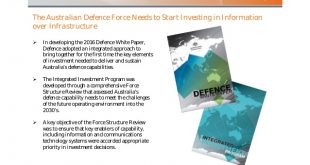U.S. Congress has directed the Defense Advanced Research Projects Agency (“DARPA”), the research and development agency of the U.S. Department of Defense, to secure its funded research from undue influence through the establishment of an initiative and relevant policies.
According to Research and Development National Security Policy, “Unfortunately, some foreign governments, including the People’s Republic of China, have not demonstrated a reciprocal dedication to open scientific exchange, and seek to exploit open United States and international research environments to circumvent the costs and risks of conducting research, thereby increasing their economic and military competitiveness at the expense of the United States, its allies, and its partners. While maintaining an open environment to foster research discoveries and innovation that benefit our Nation and the world, the United States will also take steps to protect intellectual capital, discourage research misappropriation, and ensure responsible management of United States taxpayer dollars. This includes steps to ensure that participants with significant influence on the United States R&D enterprise fully disclose information that can reveal potential conflicts of interest and conflicts of commitment”
DARPA Director-signed Countering Foreign Influence Program (CFIP) Policy Memorandum, dated September 17, 2021
• Requires undue foreign influence risk assessment of all proposed senior/key personnel selected for
negotiation of a fundamental research grant or cooperative agreement award
• This policy may be integrated into a stand-alone guide or incorporated into an existing DARPA instruction
DARPA CFIP Risk assessment
DARPA first announced CFIP in a memorandum to its staff and contractors on September 17, 2021, stating that the newly established “undue foreign influence risk assessment” process reviews, weighs, and scores all information disclosed in funding applications, with a specific focus on the Senior/Key Person’s activities from the past four years.
CFIP BAA language details DARPA’s analysis, outlines the process, and defines key terms
• Requires undue foreign influence risk assessment of all proposed senior/key personnel selected for negotiation of a fundamental research grant or cooperative agreement award
• Proposers must fill out the SF 424 (Research and Related Senior/Key Person Profile (Expanded)) for all Senior/Key Personnel along with biographical sketch and current and pending support, as applicable.
• Does not collect information on nationality and is compliant with Civil Rights Act of 1964 (i.e., information regarding race, color, and national origin is not collected and does not have any bearing on DARPA’s assessment)
The CFIP risk assessment process will be conducted separately from the DARPA scientific review process and adjudicated prior to final award.
In particular, CFIP analyzes the Senior/Key Person’s:
DARPA CFIP is using a risk algorithm to assess the level of risk posed by a DARPA researcher’s relationship with a foreign institution.
- Participation in a foreign talents program;
- Any relationship with an entity on the U.S. government’s denied entity or person list, or an entity sanctioned by the U.S. as defined in a 2020 executive order that focused on Chinese companies with suspected ties to China’s military, such as Huawei;
- Funding received from “a foreign government or a foreign government-connected entity of a strategic competitor or [a country with a history of targeting U.S. technologies];” and
- Any relationship with a “high-risk foreign government, or foreign government-connected, institution or entity.”
One of these factors alone is not necessarily a bar to funding. Rather, funding applications receive one of four scores: Low risk; Moderate risk; High risk; or Very High risk, with decisions on funding risk – and ultimately the funding itself, made accordingly.
The score awarded to the funding application determines what steps, if any, must be taken in connection with the application to mitigate or eliminate the potential conflict. An application with a Low risk or Moderate risk score presents a minimal foreign influence risk, and therefore does not require any further action by a funding applicant.
An application with a High risk score indicates past or recent relationships with high-risk foreign governments or foreign government-connected institutions or entities, and thus the applicant is regarded as potentially presenting a foreign influence risk. A funding application with a Very High risk score indicates that the Senior/Key Person has an active or ongoing relationship with a high-risk foreign government or foreign government-connected institutions or entities and thus presents a serious foreign influence risk.
High risk applications may mean the institution involved must prepare a plan to address and mitigate the potential risk – for example, by removing the Senior/Key Person from the funding application. Those mitigation plans can bring the risk down to a Low or Moderate rating. DARPA may also ultimately decide not to award the grant or contract, either because the risk remains to great or the changes to the application affects the proposals capabilities
A new analysis from the law firm Ropes & Gray concluded that “while the DARPA CFIP risk-based algorithm is limited to DARPA-funded research, it provides insight and transparency into how federal funding agencies may view and weigh a researcher’s past and present foreign relationships, and we expect to see similar types of guidance from other funding agencies as the agencies begin to implement National Security Presidential Memorandum 33 (NSPM-33) with respect to government-supported research.”
References and Resources also include:
 International Defense Security & Technology Your trusted Source for News, Research and Analysis
International Defense Security & Technology Your trusted Source for News, Research and Analysis
